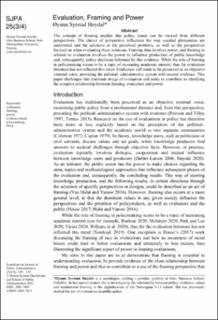Evaluation, Framing and Power
Academic article
Published version

Åpne
Permanent lenke
https://hdl.handle.net/11250/2981042Utgivelsesdato
2021Metadata
Vis full innførselSamlinger
- Publikasjoner fra Cristin [3269]
- SAM - Handelshøyskolen [392]
Originalversjon
https://ojs.ub.gu.se/index.php/sjpa/article/view/5354Sammendrag
The concept of framing implies that policy issues can be viewed from different perspectives. The choice of perspective influences the way societal phenomena are understood and the solutions to the perceived problems, as well as the perspectives focused on when evaluating these solutions. Framing thus involves power, and framing in relation to evaluation involves the power to influence production of public knowledge and, subsequently, policy decisions informed by this evidence. While the role of framing in policymaking seems to be a topic of increasing academic interest, thus far evaluation literature has not reflected this trend. Evaluation still tends to be perceived as an objective external voice, providing the political–administrative system with neutral evidence. This paper challenges this dominant image of evaluation and seeks to contribute to clarifying the complex relationship between framing, evaluation and power.
